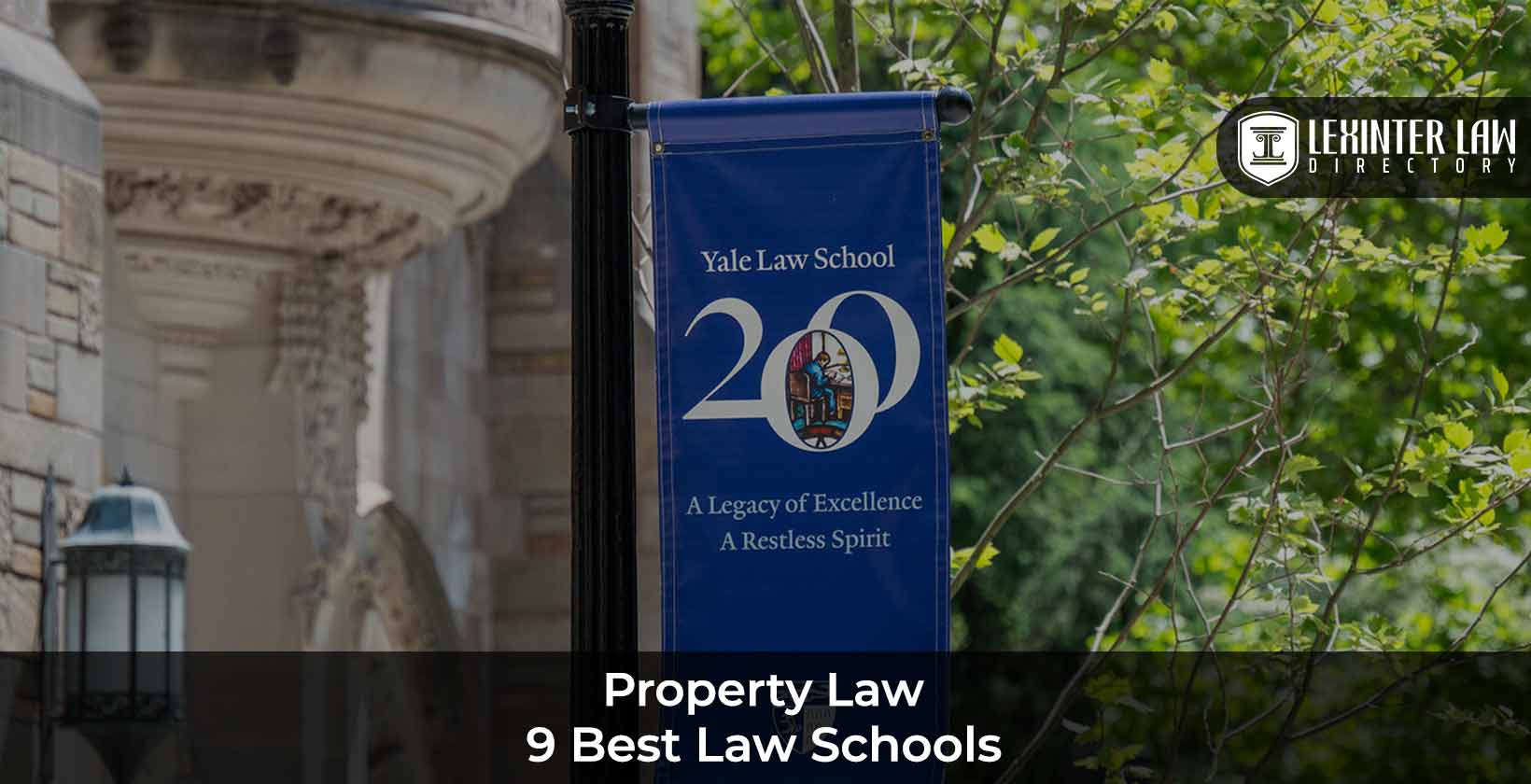9 Best Law Schools For Property Law
There are nine law schools that stand out as the top choices for students pursuing a property law degree. The institutions are recognized for their strong property law programs, exceptional faculty, and opportunities for practical experience. Yale University Law School, known for its intellectual rigor and faculty expertise, leads the way in legal education. Harvard Law School, another leader in legal education, provides robust coursework and access to property law clinics that ensure hands-on experience. Stanford Law School is another prominent choice for students aspiring to excel in property law. The institution combines a strong academic foundation with practical experience, allowing students to understand the legal issues surrounding property rights. New York University School of Law has earned a reputation for producing graduates with expertise in real estate and urban development law. Columbia Law School and the University of Pennsylvania Law School further solidify their positions among the best property law schools. Columbia’s curriculum emphasizes property law’s historical and theoretical aspects, while Penn Law integrates real estate law with corporate law, offering students a broader perspective. Students find that the institutions offer the depth and flexibility needed for success, whether in traditional property law or real estate development. A property law degree from any of the top schools opens doors to diverse legal careers, including positions in law firms, government, and academia.
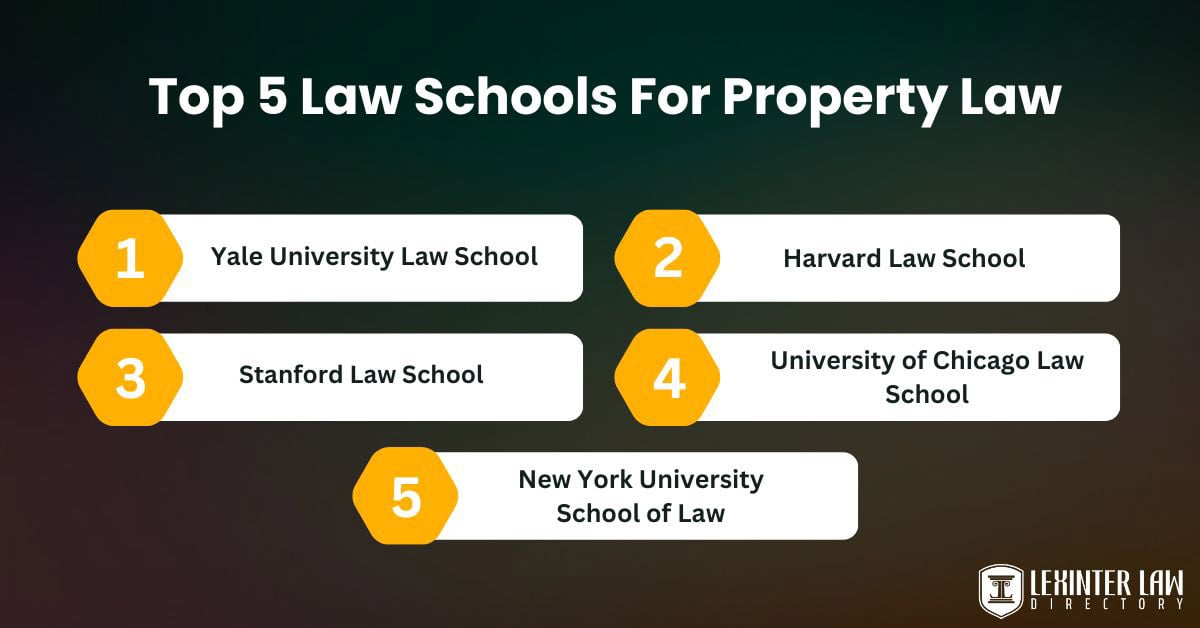
The top five law schools for property law are listed below.
- Yale University Law School: Yale University Law School excels in property law education. The law school, established in 1824, offers diverse specialized programs, including Juris Doctor, Master of Laws, and joint degrees in law and other disciplines. The acceptance rate was 5.58% for 2023-2024, with median LSAT scores of 175 and GPA of 3.96. Tuition stands at $76,369, with an average financial aid grant of $32,852. Clinical programs provide hands-on experience, while alumni secure prestigious roles across various legal fields.
- Harvard Law School: Harvard Law School, established in 1817, is a leading institution for property law education. The law school, established in 1824, offers diverse specialized programs, including Juris Doctor, Master of Laws, and joint degrees in law and other disciplines. The 2024 acceptance rate was 9.58%, with a median LSAT score of 174 and a GPA of 3.93. Tuition is $78,692, with total costs reaching $111,798. Clinical programs provide hands-on experience, while extensive networking opportunities and a distinguished faculty enhance student career prospects in property law.
- Stanford Law School: Stanford Law School, established in 1893 in California’s Silicon Valley, excels in property law education. The law school offers a dynamic curriculum blending traditional legal theory with modern problem-solving, supported by interdisciplinary programs and a robust alumni network. The 2024 acceptance rate is 7.26%, with a median LSAT of 173 and a GPA of 3.95. Tuition is $73,713, and 58.61% of students receive financial aid. Clinics and specialized programs provide hands-on experiences, while extensive networking opportunities and notable faculty enhance career prospects in property law.
- University of Chicago Law School: The University of Chicago Law School, established in 1902, excels in property law, offering diverse degree programs, including JD, LLM, JSD, and MLS. The law school provides interdisciplinary joint degrees and certificates, such as Law and Economics. The 2023-2024 acceptance rate is 12.78%, with a median LSAT of 173 and a GPA of 3.94. Tuition is $77,877, and financial aid covers an average of 19% of costs. Specialized courses, clinics, and notable faculty, like Lee Fennell and Omri Ben-Shahar, enhance practical skills and critical legal thinking.
- New York University School of Law: New York University School of Law, established in 1835 in Manhattan, offers a leading property law program. The law school’s Juris Doctor and advanced degrees, including joint programs, provide specialization in various legal fields. The 2024 acceptance rate is 16.76%, with a median LSAT of 172 and a GPA of 3.90. Tuition is $80,014, and 60.79% of students receive financial aid. Property law courses cover real estate, housing policy, and land use. Renowned faculty and clinics offer practical experience, while a strong alumni network enhances career prospects.
Table of Contents
- 1. Yale University Law School
- 2. Harvard Law School
- 3. Stanford Law School
- 4. University Of Chicago Law School
- 5. New York University School Of Law
- 6. Columbia Law School
- 7. University Of Pennsylvania Law School
- 8. University Of Michigan Law School
- 9. University Of California, Berkeley School Of Law
- How To Choose The Best Law School For Property Law?
- Which Degree Is Best For Property Lawyers?
1. Yale University Law School
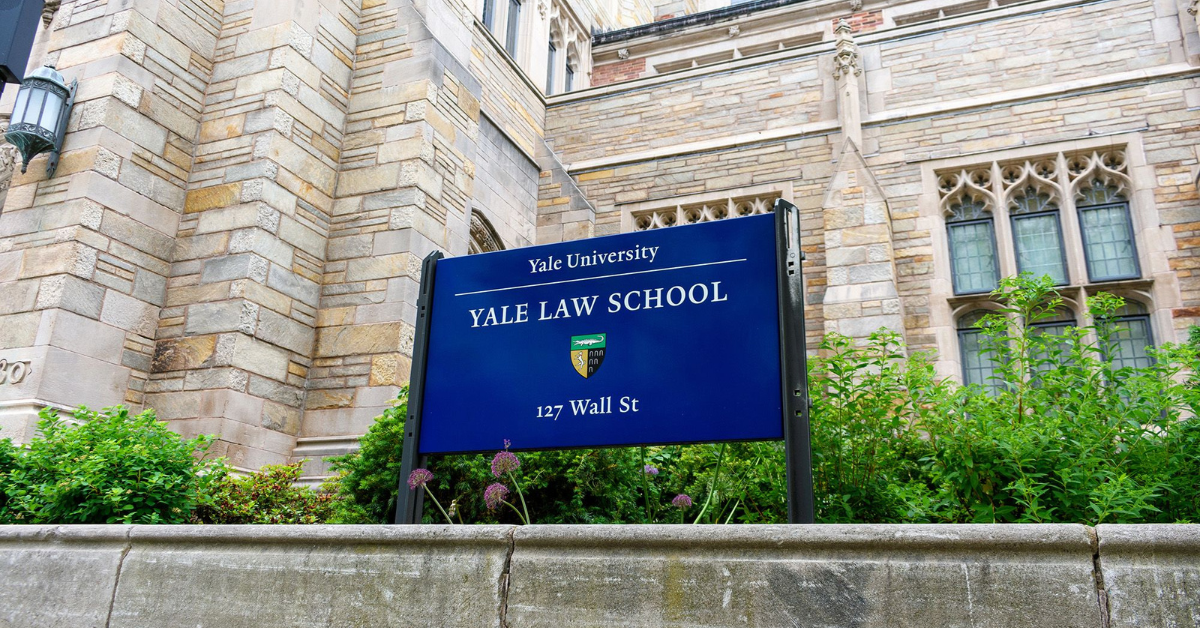
Yale University Law School stands among the best law schools for property law. The institution has consistently produced top legal minds specializing in property law, contributing to its distinguished reputation. The law school, established in 1824, is located in New Haven, Connecticut. The institution, as part of an Ivy League university, has shaped legal education in the U.S. by emphasizing theoretical and practical approaches to law. Yale University Law School provides a range of specialized law degrees tailored to various academic and professional goals. The Juris Doctor is the primary three-year program for students aiming to practice law, offering specialization in corporate and constitutional law areas. A one-year Master of Laws is available for legal scholars pursuing academia, with only about 25 students admitted each year. The school offers a Doctor of the Science of Law and a Ph.D. in Law for advanced legal research geared toward future scholars. Joint degrees combining law with management, environmental, or public policy studies are available, generally requiring four years of study.
Yale Law School maintains an exceptionally competitive admissions process, with an acceptance rate of 5.58% for the 2023-2024 academic year. Prospective students face rigorous academic expectations, as the median LSAT score reached 175, and the median GPA stood at 3.96. Tuition and fees for the 2024-2025 academic year rose by 3.39% to $76,369, bringing total attendance costs to $100,469 when living expenses and other personal costs are included. Financial aid assists 63% of full-time students, with an average grant of $32,852. Yale University holds the top spot, sharing the No.1 ranking among 196 law schools. The institution is renowned for its strong emphasis on intellectual property and real estate law, offering comprehensive courses that equip students with critical legal skills.
Yale Law School offers specialized programs in property law, providing students with a comprehensive understanding of the field. Core courses include Property Law, which examines legal concepts around ownership and transfer of property, covering real estate, personal property, and intellectual property. The Advanced Property seminar engages students in a deeper exploration of property rights and disputes, allowing more focused study. Housing and Community Development emphasizes legal frameworks in real estate and urban development, combining theoretical knowledge with hands-on experience through clinics. The Art and Cultural Property Law course tackles issues related to ownership and protection of cultural heritage, including art and antiquities. Students gain practical experience through the Mortgage Foreclosure Litigation Clinic, focusing on real estate law. Yale’s Center for Private Law hosts seminars on the role of technology and other evolving topics in private law, fostering discussion among leading academics and practitioners in the property law field.
Yale Law School’s faculty in property law includes several distinguished scholars offering diverse perspectives. Carol M. Rose, a renowned expert in property and environmental law, explores the intersection of property theory, social justice, and environmental concerns. Robert C. Ellickson, professor emeritus, is known for his work on urban law and land use, with his book Order Without Law highlighting informal norms in property disputes. Claire Priest specializes in the historical evolution of property law, particularly in early America, with her book Credit Nation, which analyzes colonial credit systems. The faculty members enrich the study of property law through their diverse expertise and extensive contributions to the field.
Yale Law School’s Housing Clinic provides students with opportunities to address housing-related legal issues, including foreclosures and evictions. Students represent low and moderate-income clients in court while engaging in advocacy efforts to combat housing injustice. The Ludwig Center for Community & Economic Development allows students to support affordable housing developers and community organizations. Students in the clinic gain experience in community development and economic mobility. The clinical programs offer hands-on opportunities to make meaningful contributions to property law and housing policy. Yale Law School provides extensive networking opportunities through an influential alumni network. Robert C. Ellickson, a key scholar in property law, has made significant contributions to land use and urban development. Carol M. Rose, another notable figure, has shaped the field of property theory and environmental law. Graduates like William F. Baxter and Supreme Court Justice Clarence Thomas have impacted legal thought in property and regulatory issues. Alumni events and resources help students connect with leaders in government, academia, and business. Yale Law School graduates secure prestigious roles across legal fields, including property law, with strong employment outcomes. 98% of the Class of 2023 were employed within ten months, entering diverse sectors like public interest, academia, and business.
2. Harvard Law School

Harvard Law School ranks as one of the best institutions for property law, offering comprehensive courses that prepare students for complex legal challenges in the area. The school, founded in 1817 in Cambridge, Massachusetts, holds the title of the oldest continuously running law school in the U.S.The institution supports diverse legal research and specialization with a vast array of academic resources, including an extensive law library. Students benefit from engaging with experienced faculty members who are leaders in various fields of law. Harvard Law School offers a range of law degree programs designed for various stages of legal careers. The Juris Doctor program, spanning three years, prepares students for practicing law in the U.S. The Master of Laws degree caters to international lawyers seeking advanced expertise over a one-year period. Students pursuing legal academia opt for the Doctor of Juridical Science, involving extensive research and dissertation work. Joint degrees with Harvard’s graduate schools and executive education programs provide further specialized opportunities for professionals.
Harvard Law School maintains a highly selective admissions process, reflected in the 2024 acceptance rate of 9.58%. The median LSAT score for accepted students stands at 174, and the median undergraduate GPA is 3.93. Tuition for the 2024-2025 academic year is $78,692. The total cost of attendance, factoring in housing, books, and other costs, is estimated at $111,798, signifying a significant financial investment. Harvard University is ranked No. 4, tied among 196 law schools across the nation. The institution is reputed for offering specialized programs in property law, with a curriculum that integrates theoretical learning and practical application.
Harvard Law School offers specialized property law courses and a comprehensive property law curriculum that addresses various aspects of ownership, control, and resource distribution. The foundational course, Property Law, delves into land transfers, zoning, leases, and the takings doctrine while examining social issues like racial and economic inequality. Advanced Real Estate Transactions focuses on commercial property complexities, including finance and development. Intellectual Property Law addresses rights involving patents and copyrights. Students explore land use regulation through courses linking property law with environmental issues. The Transactional Law Clinics provide practical experience, particularly in real estate. Workshops and reading groups offer further engagement with specialized property topics, enabling students to deepen their knowledge. The combination of theoretical and practical opportunities prepares students for careers in diverse property-related fields, including housing, intellectual property, and public land policy.
Harvard Law School’s property law faculty is widely recognized for their contributions to the field. Maureen E. Brady focuses on property law, zoning, and the economic impact of property systems. Joseph William Singer, an expert in property rights and housing law, has extensively explored property’s role in social inequality. Henry E. Smith contributes significantly to property theory and intellectual property law. Students benefit from their insights through courses, seminars, and clinics, gaining a comprehensive understanding of property law issues and real-world applications. Harvard Law School offers valuable clinical opportunities in property law, providing practical, hands-on experience. The Transactional Law Clinics allow students to engage with real estate transactions, community development, and zoning matters, assisting small businesses and nonprofits. The Housing Law Clinic focuses on representing low-income tenants in eviction cases and housing insecurity. Students advocate for legislative reform and work with specific vulnerable populations. The clinics enable students to apply legal concepts to real-world property law issues, enriching their academic and professional development.
Harvard Law School offers numerous networking opportunities for students pursuing property law. The Harvard Association for Real Estate and Law connects students and alumni through events, speaker sessions, and career treks. HLS Amicus provides an online platform that facilitates mentorship and professional relationships in various legal fields, including property law. Notable alumni, such as Joseph William Singer, have made significant contributions to property rights and land use. The resources enable students to build strong connections and advance their careers in property law. Harvard Law School graduates, including lawyers pursuing property law, secured impressive full-time employment outcomes, with 97% of the Class of 2023 employed. The school funds public service fellowships annually, supporting careers in non-profits and government roles.
3. Stanford Law School
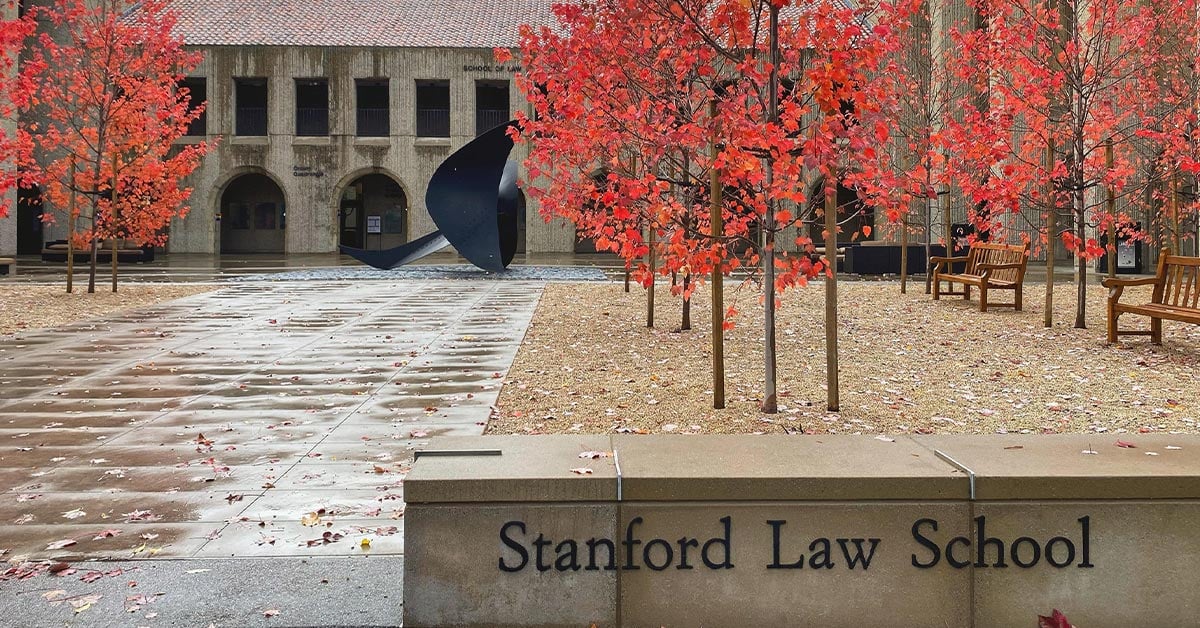
Stanford Law School stands out as one of the best for property law, offering students robust courses and opportunities to engage deeply with property-related legal issues. Stanford University, established in 1893, is located in Stanford, California, within Silicon Valley. The institution has gained a reputation for blending traditional legal education with cutting-edge developments, reflecting the dynamic environment surrounding it. Students have access to a vast network of alumni, interdisciplinary programs, and collaborative research initiatives. Stanford Law School provides a range of law degrees designed to prepare students for diverse careers, including academia, legal practice, and public policy. The Juris Doctor (JD) program spans three years and includes options for joint degrees like JD/MBA and JD/PhD. International students pursue the one-year Master of Laws (LLM) program, with specializations in Corporate Governance, Environmental Law, and others. Research-focused students earn a JSD or Master of Science in Law through the SPILS program. Clinical opportunities further enhance practical training.
Stanford Law School’s 2024 acceptance rate stands at 7.26%, highlighting the school’s selectivity. The median LSAT score for admitted students is 173, with a median undergraduate GPA of 3.95. Tuition costs $73,713 for the academic year, while living expenses, including housing and personal costs, amount to $34,458 annually. Financial aid plays a significant role, as 58.61% of full-time students receive grants or scholarships. The average award covers 46% of tuition, translating to an average grant of $34,199.
Stanford University shares the No. 1 ranking among 196 law schools nationwide. The law school is reputed for its cutting-edge research in property law, offering students extensive opportunities to engage in practical case studies and interdisciplinary projects.
Stanford Law School offers specialized programs in property law through a range of courses and practical experiences. The institution is recognized as one of California’s top law schools. Students explore property ownership, transfers, and land use in the foundational Property Law course. Real Estate Transactions dives into the financial and legal aspects of real estate deals, providing essential skills for navigating complex transactions. Land Use Law focuses on government regulation of privately owned land, intersecting frequently with environmental law. Environmental law electives further allow students to examine property law’s role in addressing climate change and energy transitions. Clinics, including the Environmental Law Clinic, give students hands-on experience with land use and environmental justice issues. Students craft interdisciplinary joint degrees, integrating property law with business or environmental studies to create a customized academic pathway suited to their interests.
Stanford Law School has several notable faculty members specializing in property law. Gregory Ablavsky focuses on property law, legal history, and Federal Indian Law, researching sovereignty and territory in early America. Barbara Fried explores the philosophical and legal foundations of property rights, particularly in relation to law, economics, and distributive justice. Paul Goldstein is a leading expert in intellectual property law, contributing significantly to the understanding of intangible assets. The faculty members enhance the study of property law at Stanford through their research and teaching.
Stanford Law School provides valuable clinical opportunities for students interested in property law. The Juelsgaard Intellectual Property and Innovation Clinic allows students to work on intellectual property issues related to technology and business. The Environmental Law Clinic offers hands-on experience in land use, conservation, and environmental regulation cases. The Community Law Clinic provides opportunities to engage with housing law by assisting low-income clients. The clinics offer students practical experience, enabling them to apply property law concepts to real-world legal challenges.
Stanford Law School provides excellent networking opportunities through its strong alumni network. The Stanford Law Alumni Association connects students with alumni practicing in property and intellectual property law. Property Law and Real Estate events, including the Stanford Real Estate Conference, offer chances to meet professionals in land use law. Notable alumni include Paul Goldstein, a renowned intellectual property expert, and Peter Thiel, who has contributed to discussions on property rights in tech. The connections enrich students’ career prospects in property law.
Stanford Law School’s Class of 2023 achieved strong employment outcomes, including property law positions. 99% of graduates secured jobs or pursued advanced degrees within nine months.
4. University Of Chicago Law School

The University of Chicago Law School, established in 1902, stands among the nation’s top institutions for the study of property law. The school is located in the vibrant Hyde Park neighborhood of Chicago, providing students access to academic rigor and professional opportunities. The University of Chicago Law School offers a diverse range of law degrees aimed at preparing students for various professional paths. The Juris Doctor (JD) is a three-year program focused on developing critical theoretical, analytical, and practical legal skills, with opportunities to explore electives, clinical programs, and joint degrees. The one-year Master of Laws (LLM) caters to international students, offering an in-depth understanding of U.S. law. The Doctor of Jurisprudence (JSD) requires extensive research and a dissertation, which is perfect for lawyers pursuing academic careers. The Master of Legal Studies (MLS) provides foundational legal knowledge for professionals in non-legal fields. Joint degree options, including JD/MBA or JD/PhD, and specialized certificates, like Law and Economics, enhance interdisciplinary learning.
The University of Chicago Law School has an acceptance rate of 12.78% for the 2023-2024 academic year, reflecting a competitive admissions process. Students generally present an LSAT score averaging 173 and a GPA of 3.94. Tuition for the JD program is $77,877, while the estimated total cost of attendance reaches $106,225, factoring in housing, books, and personal expenses. Students benefit from financial aid, with the average grant being $15,000, covering approximately 19% of tuition and fees.
The University of Chicago ranks No. 3 among 196 top law schools in the United States. The institution is reputed for its rigorous curriculum, exceptional faculty, and focus on critical legal thinking.
The University of Chicago Law School offers a range of specialized programs and courses in property law, blending legal theory and practical skills. The core curriculum includes the Property course, which addresses ownership, possession, and transfer of property, along with land use regulation. Students explore land use, studying zoning laws, development regulations, and eminent domains. Real Estate Transactions focus on contracts, mortgages, and financing in real estate deals. Students gain practical experience handling cases involving property rights and environmental law through the Abrams Environmental Law Clinic. Housing and Human Rights Law explores legal protections for tenants and homeowners, particularly in urban settings. The program emphasizes experiential learning, enabling students to work on real-world cases.
Courses related to property law provide valuable insight into land use, real estate, and environmental issues. Notable faculty at the University of Chicago Law School bring deep expertise in property law. Lee Fennell, a leading scholar, explores property theory and resource distribution in her extensive writings. Omri Ben-Shahar focuses on the intersection of property rights, contracts, and economic regulations. The faculty members offer valuable interdisciplinary perspectives, enriching the property law curriculum and providing students with advanced study and research opportunities.
Clinical opportunities in property law at the University of Chicago Law School offer practical experience. The Housing Initiative Transactional Clinic allows students to engage with real estate transactions, focusing on affordable housing projects. The Abrams Environmental Law Clinic addresses property-related issues in environmental cases, including land use and regulatory compliance. The Poverty and Housing Law Clinic helps students work with clients on housing disputes and evictions. The clinics enable students to apply legal knowledge in real-world property law situations under expert supervision.
The University of Chicago Law School offers strong networking opportunities through its alumni network. Graduates engage with mentoring programs, class reunions, and affinity groups, providing valuable professional connections. Notable alumni in property law include Dan Doctoroff, who played a crucial role in New York City’s redevelopment and environmental planning. Lisa Brown has influenced federal policies impacting property law through her work in the White House. The alumni directory and exclusive LinkedIn group further enhance networking opportunities in property law and related fields. The University of Chicago Law School’s Class of 2023 achieved high employment rates, including property law positions. A remarkable 99.1% of graduates were employed within ten months, with 93.9% in long-term legal roles.
5. New York University School Of Law
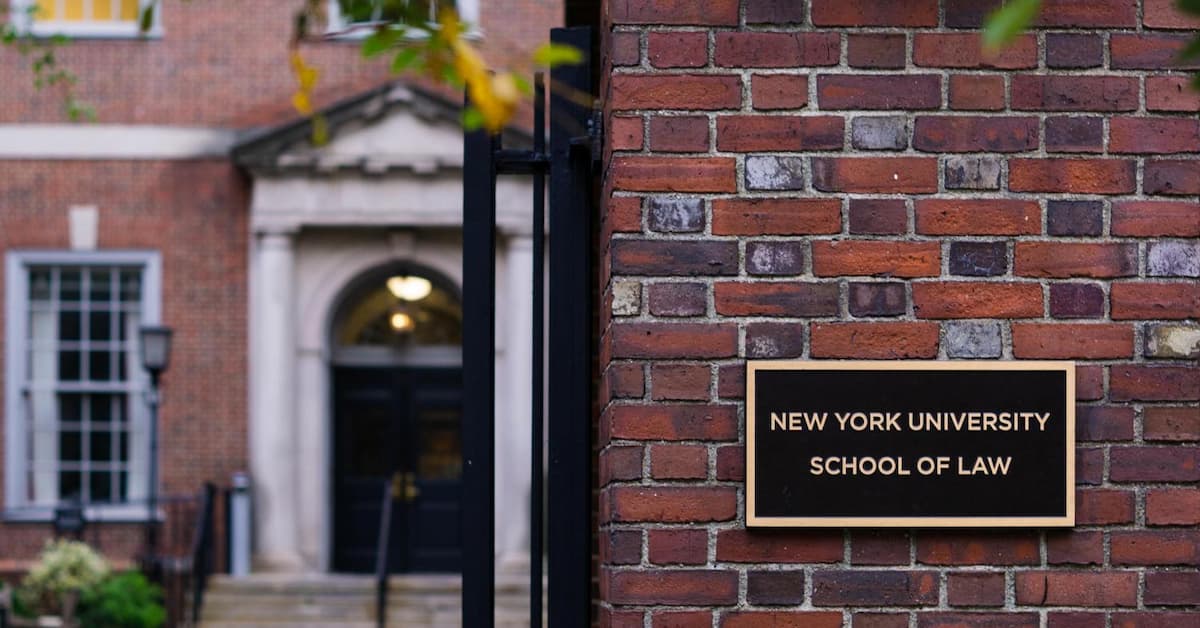
New York University School of Law stands out as one of the premier institutions for studying property law, offering comprehensive courses that cover traditional and modern aspects of the field. The institution, founded in 1835, is one of the oldest U.S. law schools in Manhattan, New York City. New York University School of Law (NYU Law) offers diverse degrees catering to various career paths in legal education. The Juris Doctor (JD) program, which takes three years, allows students to specialize in corporate, criminal, and international law. Joint-degree programs combine the JD with advanced degrees like an MBA or MPA. The Master of Laws (LL.M.) program enables further specialization, offering taxation or global business law tracks. The Doctor of Juridical Science (JSD) emphasizes legal research and academia.
New York University School of Law remains highly selective, with a 2024 acceptance rate of 16.76%. The median LSAT score of 172 and median GPA of 3.90 reflect strong academic expectations. Tuition for the year is $80,014, a 4.88% increase from last year. The total annual cost, including living expenses, reaches approximately $109,458. 60.79% of students receive financial aid, averaging $25,000 per award. NYU consistently stands out for its academic excellence and career opportunities when discussing New York top law schools. New York University ranks No. 9 (tie) out of 196 top law schools nationwide. The law school is reputed for its distinguished faculty, extensive property law courses, and strong alumni network in the legal sector.
NYU School of Law offers an extensive program in property law, focusing on housing, land use, and real estate. Students engage with critical areas such as housing policy, urban development, and real estate finance. Courses such as Real Estate Transactions teach legal and practical aspects, while Land Use Law addresses zoning and environmental regulations. Housing Law and Policy examines frameworks governing affordable and public housing. The interdisciplinary collaboration with the Robert F. Wagner School of Public Service and the Stern School of Business enriches understanding of real estate economics. Clinics and externships provide hands-on learning, particularly in New York City’s urban context. Electives like Taxation of Property Transactions and Advanced Real Estate Law offer specialized knowledge in property law and development. NYU Law’s program emphasizes theoretical knowledge and practical skills, ensuring students gain a comprehensive education. NYU School of Law boasts renowned faculty specializing in property law, real estate, and land use. Vicki Been, an expert in land use and environmental law, has co-authored a leading casebook on land use controls. Roderick M. Hills, Jr. brings expertise in constitutional law, emphasizing decentralization and local governance in land use. Clayton Gillette’s work focuses on state and local government law, examining land development. The scholars provide students with deep knowledge and practical insights in the field of property law.
NYU School of Law offers exceptional clinical opportunities in property law, land use, and real estate. The Environmental Law Clinic engages students in cases related to land use, environmental protection, and development. The Community Economic Development Clinic provides students with hands-on experience in affordable housing, urban development, and zoning law. The clinics allow students to work with clients and address real-world legal challenges. The programs ensure students gain practical skills while navigating complex issues in property law and urban policy.
NYU School of Law offers extensive networking opportunities through its active Law Alumni Association. The association organizes events, including seminars and reunions, that connect students with professionals. NYU Law’s alumni network in property law includes leaders in land use, real estate, and environmental law. Alumni like Vicki Been have significantly impacted housing policy. The Violet Network provides structured mentoring, linking students with experienced alumni in property law. The connections help students gain insights and build relationships in real estate and urban development. NYU School of Law graduates, including students in property law, achieved a 97.06% employment rate within ten months of graduation. The majority secured full-time legal positions, reflecting the strong demand for their expertise.
6. Columbia Law School

Columbia Law School is renowned as one of the top institutions for property law, offering a rigorous curriculum that explores property rights, land use, and real estate law. The institution, established in 1858, is based in Manhattan’s Morningside Heights, providing a dynamic setting for legal education. The school offers a diverse range of academic programs, including clinics that give students hands-on legal experience. Students benefit from Columbia’s distinguished faculty, which includes leading scholars and practitioners. Columbia Law School offers diverse programs catering to legal interests and career goals. The Juris Doctor (J.D.) is the main degree for practicing law in the U.S., emphasizing core legal principles in the first year, with specialized electives following. The LL.M. program helps international lawyers gain expertise in U.S. law. Executive LL.M. in Global Business Law enables professionals to advance their careers while studying part-time. Dual degrees integrate law with business, public health, or international affairs. Certificate programs provide focused training in specialized legal areas.
Columbia Law School’s acceptance rate for the 2023-2024 academic year stands at 12.23%. Admitted students generally have an average LSAT score of 173 and a GPA of 3.90, reflecting the institution’s rigorous standards. Tuition for 2024 amounts to $81,292, a 3.85% increase from the previous year. The total cost of attendance reaches approximately $113,711 annually. 62% of students receive financial aid, with average grants of around $30,000. Columbia University ranks No. 8 among 196 law schools across the United States. The law school is reputed for its comprehensive property law curriculum, renowned faculty members, and a strong emphasis on legal research and practical experience in real estate law.
Columbia Law School provides a strong foundation in property law through various specialized courses and hands-on programs. Students gain insight into ownership, resource allocation, and how legal structures influence wealth, power, and status. The foundational property course covers essential topics, including property rights, conflict resolution, and societal impacts on democracy. Columbia offers courses like real estate transactions, focusing on sales, leases, and financing of real property. Trusts and estates provide an in-depth understanding of wills, inheritance, and fiduciary duties. Students explore intellectual property law, examining ownership of intangible assets, including ideas and technology.
Upper-level seminars and clinics allow students to apply theoretical knowledge, addressing practical issues like housing rights and land use. Students receive a comprehensive education in property law through a combination of the offerings, making Columbia Law School a leading choice for students pursuing expertise in the field.
Columbia Law School has several notable faculty members specializing in property law, contributing significantly to legal scholarship. Thomas W. Merrill, the Charles Evans Hughes Professor of Law, is a renowned expert in property and administrative law, with influential works on property rights. Michael A. Heller, the Lawrence A. Wien Professor of Real Estate Law, is known for his research on ownership and societal issues. Christopher Serkin, a Justin W. D’Atri Visiting Professor, focuses on land use and eminent domain. The professors shape critical discussions in property law.
Columbia Law School offers clinical opportunities for students interested in property law, focusing on practical experience. The Entrepreneurship and Community Development Clinic provides hands-on work in real estate, property development, and neighborhood projects. The Environmental and Climate Justice Clinic allows students to engage in cases involving land use, environmental regulations, and community impact. Columbia offers Policy Labs, such as the Empirical Legal Studies Lab, where students work on research projects related to legal issues involving property. The clinics enhance practical skills and legal expertise in property law.
Columbia Law School offers numerous networking opportunities for students interested in property law. The Real Estate Law Society hosts events, career panels, and guest speakers, allowing students to connect with professionals and alumni in real estate and property law. Columbia organizes networking events featuring alumni working in real estate development, land use, and property law, providing direct engagement with industry leaders. The Columbia Law School Alumni Association connects students with graduates through global chapters, offering mentorship and job opportunities. The resources support professional growth in property law. Columbia Law School graduates, including lawyers focused on property law, achieved a 95.1% employment rate in long-term legal jobs. A significant portion, 66.3%, secured roles in prestigious law firms with over 500 attorneys.
7. University Of Pennsylvania Law School
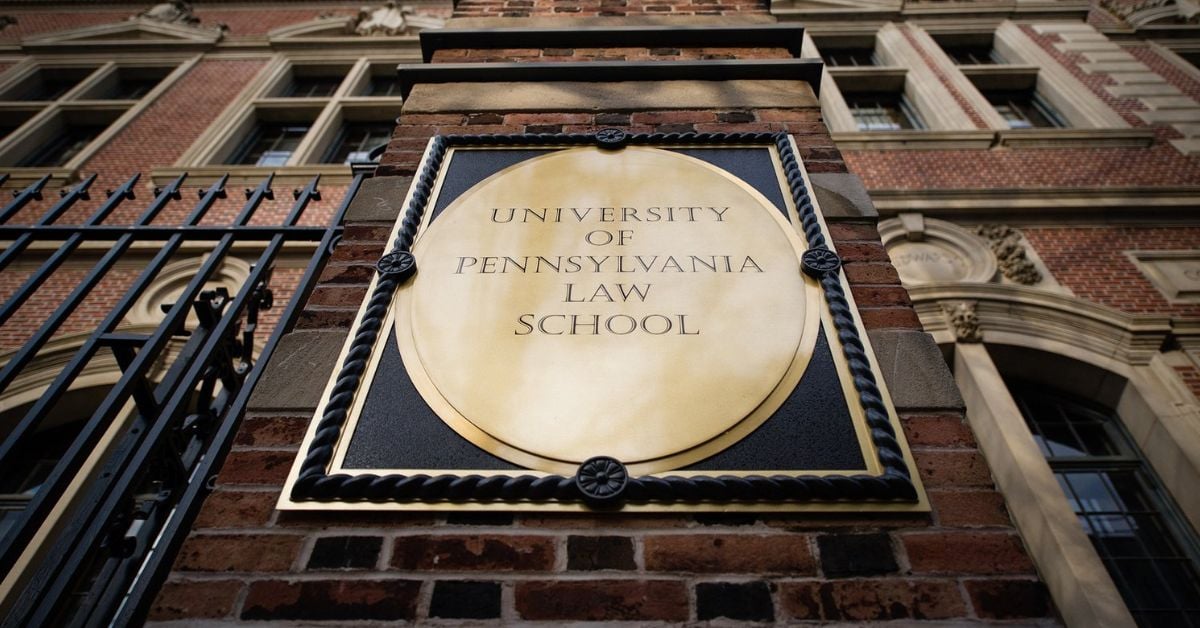
The University of Pennsylvania Law School ranks among the top institutions for property law, offering in-depth courses on real estate transactions, property rights, and land development. The school is located in Philadelphia, Pennsylvania, on the university’s historic campus and was established in 1850. The University of Pennsylvania Carey Law School offers a variety of law degrees tailored to different academic and professional goals. The Juris Doctor (JD) program spans three years and emphasizes interdisciplinary learning, with joint degrees available in business, education, public policy, and more. The Master in Law (ML) provides legal knowledge for non-lawyers in various industries, while the Doctor of Juridical Science (SJD) focuses on advanced legal scholarship and requires a dissertation. Joint degree opportunities and global programs enhance the educational experience.
The University of Pennsylvania Carey Law School maintains a highly competitive acceptance rate of 9.88% for the 2024 academic year. Tuition for the 2024-2025 academic year stands at $76,934, reflecting a 5.38% increase from the previous year. Living expenses, including room and board, are estimated at $24,788. 53.6% of students benefit from financial aid, with an average award of $40,000. The University of Pennsylvania (Carey) ranks No. 4 (tie) among 196 top law schools nationwide. The law school is reputed for its interdisciplinary approach, strong property law program, and collaboration with Wharton for legal business expertise, offering students a well-rounded legal education.
The University of Pennsylvania Carey Law School offers several courses that enable students to explore property law within broader programs like JD or LLM. Students incorporate property law into concentrations, including real estate and environmental law. Courses such as “Land Use Law in Practice” address zoning, planning, and land-use regulation. The foundational “Property” course covers key topics, including ownership and leasing. Environmental law connects to property concerns through land use and conservation. Students benefit from clinics, including the Environmental Law Project, and externships focusing on property cases. Real estate law and land-use planning represent strong focus areas for students interested in property law, supported by interdisciplinary coursework and hands-on legal practice opportunities. The experiences help prepare students for real estate or land use development careers, offering practical and theoretical insights into property-related legal matters.
Notable faculty at the University of Pennsylvania Carey Law School specialize in property law, advancing scholarship and teaching. Gideon Parchomovsky, an expert in property and intellectual property law, has made significant contributions to property theory through his research. Shyamkrishna Balganesh focuses on property law and legal theory, organizing symposia that foster interdisciplinary discussions. David Hoffman, a scholar in contracts and property law, teaches courses exploring land use and regulatory property issues. The faculty members enhance the academic study of property law at Penn Carey Law. Students at the University of Pennsylvania Carey Law School explore property law through clinical opportunities that offer practical experience. The Gittis Center for Clinical Legal Studies provides clinics where students handle issues intersecting with property, business, and intellectual property law. The Entrepreneurship Legal Clinic gives students exposure to real estate matters through advising startups. Students gain property law experience through externships with nonprofits and government agencies focused on land use and property issues. Faculty mentorship enhances the clinical opportunities in property law practice.
The University of Pennsylvania Carey Law School boasts a strong network of notable alumni in property law. Gene E.K. Pratter, a distinguished judge, has made significant contributions to legal ethics and property-related cases. Ed Rock, another prominent alumnus, played a key role in shaping corporate and property law through his leadership at the Institute for Law and Economics. The alumni offer valuable networking opportunities, connecting students with professionals and scholars in property law and related fields and enhancing their career prospects. The University of Pennsylvania Carey Law School continues to excel, with graduates securing positions in diverse fields, including property law. 99% of the Class of 2022 achieved employment or pursued further studies within ten months of graduation.
8. University Of Michigan Law School

The University of Michigan Law School stands as one of the leading institutions for property law, providing comprehensive courses that cover real estate, land use, and intellectual property. The law school, established in 1859, is situated in Ann Arbor, Michigan, on a picturesque campus that fosters an engaging academic atmosphere. Students benefit from a diverse range of programs, including clinics that offer practical legal experience. The University of Michigan Law School offers diverse law degree programs, including the JD, LLM, SJD, and various dual degree options. Students in the JD program receive a comprehensive education that blends theory and practical skills with opportunities for specialization. The LLM program, tailored for international law graduates, provides in-depth exposure to U.S. legal principles. Lawyers seeking academic careers pursue the SJD, focusing on extensive legal research. Dual degree options, including JD/MBA and JD/MPH, facilitate interdisciplinary education across multiple fields.
The University of Michigan Law School had a 12.58% acceptance rate for the 2023-2024 academic year, demonstrating a competitive admissions process. Enrolled students showed strong academic credentials, with a median LSAT score of 171 and a median GPA of 3.85. Tuition was set at $69,584 for Michigan residents and $72,584 for non-residents. Estimated annual living expenses, covering room, board, and personal costs, amounted to approximately $24,786. The University of Michigan–Ann Arbor ranks No. 9 (tie) among 196 leading law schools. The institution has been recognized as one of the top law schools in Michigan. The law school is reputed for its strong property law curriculum, dedicated faculty, and an emphasis on combining legal theory with practical experience through clinics and externships.
The University of Michigan Law School provides specialized programs in property law, integrating legal studies with fields like environmental law, finance, and urban planning. The programs offer students the chance to combine JD degrees with specializations, including LLMs, allowing deeper study in property law areas. Courses include foundational studies, such as Property, which examines possessory estates, future interests, and land-use regulation. Advanced courses, like Property II, focus on real estate law topics, including conveyancing, landlord-tenant relationships, and land title insurance. The Environmental Law & Real Property course addresses how regulations impact property, covering aspects of waste management, habitat protection, and historic preservation. Real Estate Transactions emphasizes legal documentation, negotiation, and issue resolution in property deals. Students gain theoretical knowledge and hands-on skills, preparing them for diverse careers in real estate law, urban development, and environmental regulation. The interdisciplinary approach enhances their understanding of property-related legal frameworks.
The University of Michigan Law School boasts notable faculty members with expertise in property law. Alexandra Klass, the James G. Degnan Professor, co-directs the Environmental and Energy Law Program, focusing on property law’s intersection with environmental issues. James E. Krier, Earl Warren DeLano Professor Emeritus, is a renowned scholar in property law and economics. Aaron Perzanowski, the Thomas W. Lacchia Professor, examines the evolving nature of ownership within digital marketplaces. The expertise enriches the academic environment and offers students diverse perspectives on property law.
The University of Michigan Law School offers clinical opportunities in property law, providing hands-on experience. The Community Enterprise Clinic assists nonprofits and small businesses with real estate transactions, focusing on land use and urban development. The Zell Entrepreneurship Clinic supports startup ventures, advising on lease agreements and property-related contracts. The International Transactions Clinic introduces students to cross-border deals, including international real estate and investment contracts. Students gain practical legal skills by working directly with clients under faculty supervision, enhancing their understanding of property law.
The University of Michigan Law School offers extensive networking opportunities for students and graduates interested in property law. The Office of Career Planning provides resources like job bulletins, career counseling, and networking events. Michigan Law Connect helps alumni engage in mentorship across various legal fields, including property law. Annual alumni events and regional meetups facilitate professional connections in real estate and environmental law. The law school’s vast alumni network, spanning over 22,000 graduates globally, offers valuable career advancement opportunities in property law fields. The University of Michigan Law School maintains strong employment outcomes, including property law careers. 95.4% of the Class of 2023 secured long-term, full-time legal positions.
9. University Of California, Berkeley School Of Law
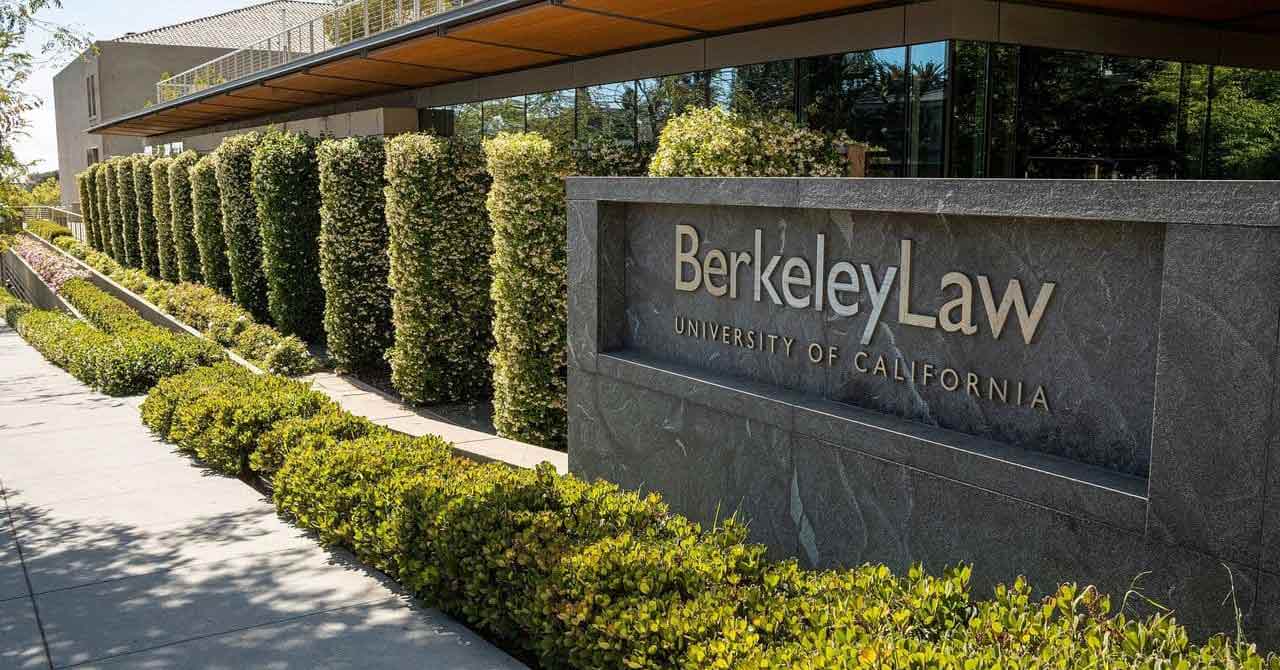
The University of California, Berkeley School of Law is recognized as one of the top institutions for property law, offering robust courses that address property rights, real estate development, and environmental land use. The school is located in Berkeley, California, near the vibrant San Francisco Bay Area, and was established in 1894. Students have access to an interdisciplinary curriculum that integrates law, technology, and public policy, preparing them for diverse legal challenges. The University of California, Berkeley School of Law offers a range of degrees designed for diverse legal career paths. The JD, a three-year program, prepares students to become licensed attorneys in environmental, business, and intellectual property law areas. Lawyers advance their education through the LL.M., available in traditional and executive tracks, with specializations in fields like business law. Professionals from various sectors deepen their legal understanding through the M.L.S., a flexible program. Joint degrees combine legal education with graduate programs, enhancing interdisciplinary expertise.
The University of California, Berkeley School of Law has a highly selective acceptance rate of 14.92% for the 2023-2024 academic year, reflecting the competitive nature of admissions. Tuition for 2024 is set at $62,567 for California residents, while out-of-state students pay $74,995, reflecting increases of 5.6% and 10.6%, respectively, from the previous year. Average living expenses, including room and board, total $36,834, bringing total costs to $99,401 for residents and $111,829 for non-residents. The University of California, Berkeley ranks No. 12 among 196 top law schools nationwide. The law school is reputed for its innovative property law courses, focus on environmental law intersections, and a strong commitment to public interest legal work.
UC Berkeley School of Law offers specialized programs in property law, focusing on interdisciplinary studies. The Interdisciplinary Graduate Certificate in Real Estate combines law, investment, and development, preparing students for careers in real estate, land use, and urban planning. The Environmental Law Certificate integrates property law with environmental regulation, addressing land use and sustainability issues, ideal for students merging legal and environmental interests. Students have access to diverse courses that enhance their understanding of property law. Core Property Law covers essential topics such as property rights, land ownership, leases, and transfers. Land Use and Urban Development courses emphasize legal frameworks governing property use and urban planning, while Real Estate Transactions teach contract negotiation, financing, and deal structuring. Students interested in environmental issues benefit from electives covering land conservation, zoning, and legal aspects of resource use, providing a comprehensive view of property law’s applications.
UC Berkeley School of Law has a distinguished faculty presence in property law, contributing to legal scholarship. Hanoch Dagan focuses on private law theory, exploring property and contracts while directing the Berkeley Center for Private Law Theory. Molly Van Houweling examines property’s role in intellectual and technological innovation, addressing how regulation affects rights. Christine A. Klein brings expertise in environmental and water law, linking property law with natural resource management. Ben Depoorter analyzes the economic aspects of property rights, focusing on legal and regulatory impacts. The faculty members shape the future of property law through their research and teaching.
UC Berkeley School of Law offers clinical opportunities in property law through diverse programs. The Environmental Law Clinic involves legal work on cases related to land use, water rights, and pollution. The New Business Community Law Clinic focuses on transactional law, including real estate transactions and business property rights. The Policy Advocacy Clinic addresses issues intersecting with property law, such as housing policy and zoning laws. Berkeley Law’s clinics provide hands-on legal practice, helping students develop litigation, negotiation, and policy skills. UC Berkeley School of Law boasts a strong alumni network that actively supports student development. The Career Development Office (CDO) encourages connections between students and alumni, offering mentorship, career advice, and networking opportunities. Events, networking sessions, and structured mentoring programs enhance the connections, providing insights into property law fields. Notable alumni have excelled in areas intersecting with property law, including environmental law and real estate. Wilson Dunlavey is recognized for his role in environmental settlements involving land use and property rights. Students benefit greatly from leveraging the robust alumni network. UC Berkeley School of Law reported a 94.34% employment rate for the Class of 2023, including property law. Graduates secured positions across diverse sectors, reflecting strong career outcomes.
How To Choose The Best Law School For Property Law?

To choose the best law school for property law, follow the five steps listed below.
- Evaluate the School’s Program and Faculty Expertise. Research law schools that offer specialized property law programs, emphasizing real estate, land use, and intellectual property. Law schools with distinguished faculty who have practical and academic expertise in property law fields provide the best training. Consider schools that organize workshops, seminars, and clinical programs on property law topics. The quality of faculty and availability of focused coursework greatly impact the learning experience.
- Review the School’s Reputation and Rankings. Top law schools receive higher rankings and recognition for their property law programs. Comparing schools with strong reputations in the property law field helps in determining the quality of education provided. U.S. News & World Report and other ranking platforms frequently assess schools based on faculty credentials, alumni success, and program resources. A law school’s reputation greatly influences future career opportunities in property law.
- Analyze the School’s Internship and Networking Opportunities. Investigate whether the law school has partnerships with real estate firms, government agencies, or non-profits specializing in land use and property rights. Strong connections with industry professionals and organizations enhance practical learning and job placement in the property law field. Schools offering specialized internships and externships in property law provide significant career advancement opportunities for aspiring lawyers.
- Examine Course Offerings and Extracurricular Activities. Investigate comprehensive programs that include diverse courses, such as real estate transactions, land use planning, and intellectual property. Extracurricular activities like property law societies, moot court competitions, and workshops provide additional learning experiences. Schools offering a variety of classes and practical exercises in property law enable students to develop specific expertise. Reviewing a school’s curriculum reveals the depth of its commitment to property law education.
- Assess the Alumni Network and Career Support. An active alumni network within the property law sector indicates strong career support and opportunities. Law schools connect students with alumni who work in property law firms, government agencies, and corporations. Career services offices that specifically cater to property law students provide valuable resources for internships, mentorship, and job placement. Schools with a well-established network increase career prospects significantly for property law students.
What Is Property Law?
Property law regulates the ownership, transfer, and use of tangible property, including land and buildings. The area of law defines the legal relationship between individuals and their possessions, ensuring rights and obligations are clearly established. Property law ensures proper registration and transfer processes are followed when individuals buy or sell property, preventing fraudulent activities. Lawyers specializing in the field advise clients on property contracts, lease agreements, and zoning laws. A property law degree provides comprehensive knowledge of the legal frameworks, equipping students with skills to navigate complex property transactions. Property law programs cover real estate law, land acquisition, landlord-tenant relationships, and zoning regulations. The programs focus on practical and theoretical aspects, preparing graduates for careers in legal firms, real estate companies, or government agencies. Property law plays an essential role in urban planning, influencing how residential and commercial spaces are organized. Understanding property boundaries and ownership rights is crucial for land development, ensuring compliance with local regulations.
Property law covers the legal framework governing the ownership, use, and transfer of property. Property law regulates different types of property, including real property (land and structures attached to it) and personal property (movable items). The branch of law provides guidelines for the acquisition, sale, leasing, and inheritance of property, ensuring the transactions comply with legal standards. Property disputes, such as boundary disagreements, trespassing, and issues between landlords and tenants, fall within its jurisdiction. The law defines various ownership forms, including joint tenancy, sole ownership, and tenancy, in common, outlining how they affect rights and responsibilities. Zoning regulations, which determine how land is used for residential, commercial, or industrial purposes, are part of property law. Property law protects ownership rights by ensuring proper documentation and legal processes for transferring and managing property.
What Is The Main Goal Of Property Law?
The main goal of property law is to regulate the relationships between people and things. The purpose of property law is to establish clear rules about the ownership, use, and transfer of assets. Property law ensures individuals and organizations securely possess, manage, and exchange property without unnecessary conflict. Legal protection for property rights enhances economic stability by promoting responsible management of resources. Property law protects individuals from unlawful deprivation of their assets, providing remedies through legal recourse. Ownership rights, as defined by property law, are fundamental for societal order and economic growth. The law allows for the resolution of disputes over land, intellectual property, and other valuable resources. The purpose of property law is to create a legal foundation for individuals and businesses to use, enjoy, and manage their property securely.
Property law works by governing the ownership, use, and transfer of legal rights to land and objects. The law provides the legal framework defining who holds the title and the conditions for the lawful use of resources. Legal systems generally classify property into two categories: real property, referring to land and immovable structures, and personal property, which includes movable items. Rights of ownership grant control over the property, including the right to sell, lease, or modify it. Disputes arise concerning ownership, boundaries, or usage, leading courts to interpret deeds and contracts. Legal principles ensure protection for the owner while considering the community’s interests through zoning laws or environmental regulations. Legal mechanisms, like easements and liens, allow others limited use of someone’s property without transferring ownership. Statutory requirements demand public registration of titles, ensuring clarity in property transactions. Property law balances individual rights with societal needs, fostering economic stability.
What Is The Benefit Of Property Law?
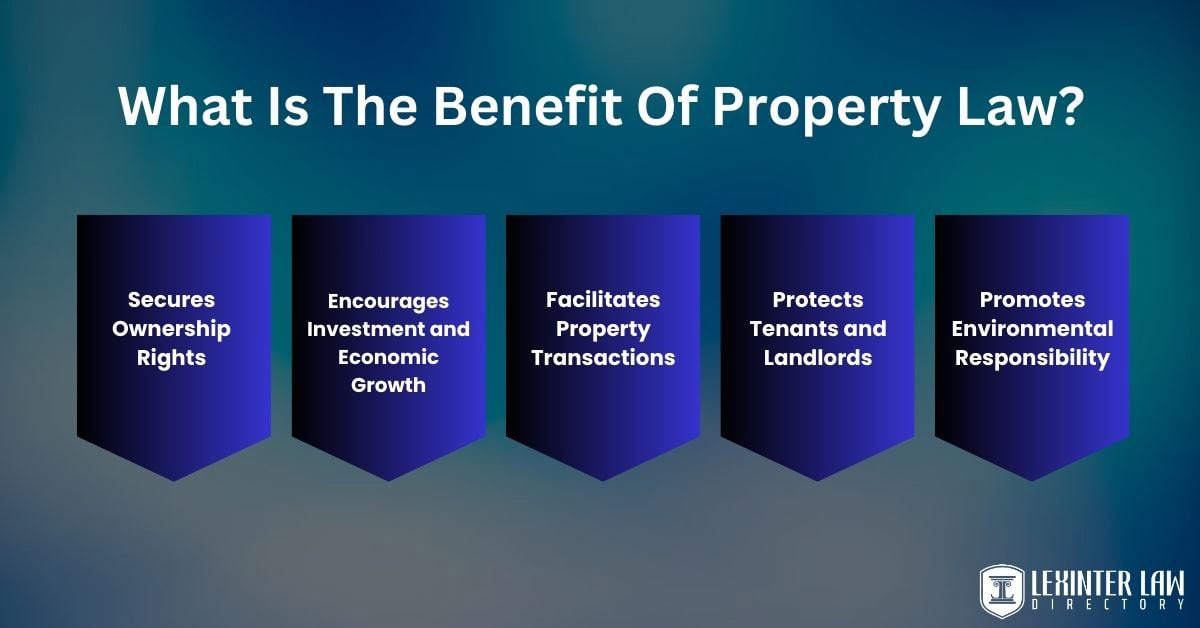
The five benefits of property law are listed below.
- Secures Ownership Rights: Property law establishes and protects ownership rights, ensuring individuals have control over their possessions. Legal systems prevent unauthorized use or transfer, safeguarding assets from fraud or theft. Ownership disputes are resolved through clear legal guidelines, offering peace of mind. The legal framework encourages responsible ownership and fosters trust among individuals and businesses.
- Encourages Investment and Economic Growth: A stable property law system promotes investments by providing domestic and foreign investors security. Entrepreneurs and businesses feel confident about investing in real estate and infrastructure projects. Economic growth is driven by secure property transactions, which help attract capital. Investors are more likely to develop land, contributing to job creation and industry expansion.
- Facilitates Property Transactions: Efficient property laws streamline the buying, selling, and leasing of assets, enhancing market functionality. Legal clarity minimizes risks associated with transactions and reduces the likelihood of disputes. Buyers and sellers are guided by standardized procedures, making transactions smoother. Lenders provide financing more easily when there is legal certainty, increasing homeownership rates.
- Protects Tenants and Landlords: Property law defines the legal relationship between tenants and landlords, protecting the rights of the parties. Tenants receive protection against unfair eviction, while landlords are ensured of rental payments and property maintenance. Legal provisions help prevent abusive practices and create guidelines for resolving conflicts. A balanced system fosters healthy rental markets and encourages proper property management.
- Promotes Environmental Responsibility: Legal frameworks related to property law include zoning regulations and environmental protections. The laws prevent over-exploitation of natural resources, ensuring sustainable land use. Zoning laws direct land development, preserving green spaces and maintaining ecological balance. Proper environmental oversight creates long-term value for communities and contributes to public health and safety.
Which Degree Is Best For Property Lawyers?
The Juris Doctor (JD) degree is the best educational path for property lawyers. The degree provides comprehensive legal training necessary to navigate the complexities of property law. Property law encompasses various areas, including real estate transactions, land use, landlord-tenant issues, and zoning regulations. A Juris Doctor program ensures lawyers understand contractual, statutory, and regulatory aspects that govern property ownership and rights. Students gain deep knowledge of legal concepts through rigorous coursework emphasizing theoretical and practical approaches. Graduates develop strong analytical and problem-solving skills critical for property law practice. The degree program offers exposure to specialized courses like real estate law, contract law, and environmental law.
A property lawyer must excel at interpreting deeds, titles, leases, and property agreements, all of which are covered extensively in JD programs. Understanding real estate finance, property disputes, and land acquisition laws requires formal legal education. Law schools offer clinics, internships, and externships that allow students to gain real-world experience in property law. Licensing as a property lawyer mandates passing the Bar exam, which requires a JD degree from an accredited institution. Legal practice in property law becomes impossible in most jurisdictions without a degree. Juris Doctor programs emphasize legal research, which enables lawyers to stay updated with changing property regulations. Legal ethics, professionalism, and fiduciary duties toward clients form a core part of the JD curriculum. Property lawyers must act as advocates and advisors, balancing technical legal requirements with client interests, all cultivated through the educational path.
How To Become A Property Lawyer?

To become a property lawyer, follow the five steps listed below.
- Earn a Bachelor’s Degree in a Relevant Field. A Bachelor’s degree is the first step in becoming a property lawyer. Law students choose majors like political science, history, or business, which prepare them for law school. Law schools generally do not require a specific major, but subjects focusing on critical thinking and legal foundations are ideal. Completing the undergraduate education is mandatory before applying to law school.
- Take the LSAT (Law School Admission Test). The LSAT is a standardized test required for law school admission. The test assesses skills in logical reasoning, analytical thinking, and reading comprehension, which are crucial for law students. Law schools use LSAT scores as a key factor in the admission process. Preparing thoroughly for the exam improves the chance of gaining entry into a reputable law program, which is essential for a successful legal career.
- Obtain a Juris Doctor (JD) Degree. Enrolling in a law school to pursue a Juris Doctor (JD) degree is necessary after passing the LSAT. The JD program generally lasts three years and covers core legal areas such as property law, contracts, and torts. Property law courses focus on real estate transactions, land use, and legal aspects of ownership. Earning a JD degree is essential for anyone planning to become a property lawyer.
- Pass the Bar Exam in the Relevant Jurisdiction. Passing the Bar exam is mandatory to practice law and earn a property law degree. The exam tests knowledge of general legal principles, including property law. Each jurisdiction has its own Bar examination, which generally consists of multiple-choice and essay questions. Proper preparation through study guides and Bar review courses is critical. Passing the Bar exam allows one to become a licensed attorney and practice property law.
- Gain Expertise in Property Law through Practice and Continuing Education. Specializing in property law requires practical experience and ongoing education. Lawyers start at firms dealing with real estate transactions, zoning laws, or landlord-tenant disputes. Continuous learning through certifications and courses in property law helps develop expertise. Remaining current with legal updates in real estate law ensures providing excellent legal services to clients.
How Long Would It Take To Study Property Law?
It would take at least seven years to study property law. The journey starts with earning a four-year Bachelor’s degree, generally in a related field such as political science or business. Students focus on foundational subjects like history, economics, or social sciences, helping them develop critical thinking skills necessary for legal studies. The next phase involves pursuing a three-year Juris Doctor (JD) degree, where law students dive deeply into legal concepts, including contracts, real estate, and constitutional law. Students are introduced to the foundational principles of law during the first year of law school, known as 1L. Core subjects, including property law, are covered during the year, giving students a broad understanding of legal concepts. The initial year is essential for building legal reasoning and analytical skills.
The second year, or 2L, allows students to take more specialized courses related to their career interests. Property law courses become more focused, covering areas like intellectual property, landlord-tenant relationships, and zoning laws. Students have opportunities to participate in internships or clinics, which help them gain practical experience in the second year. The third and final year, called 3L, is when students refine their knowledge and prepare for the Bar exam. Students take advanced property law classes and seminars, delving into complex issues like trusts, estates, and property disputes. Graduates must pass the Bar exam in their respective state before practicing property law once law school is completed. Continuing legal education (CLE) ensures attorneys remain updated on changes in property law throughout their careers.
Is Property Law Difficult?
Yes, property law is difficult. Property law is challenging due to its intricate and multifaceted nature. The law encompasses a wide range of legal issues, from ownership rights to complex land use regulations. The historical development of property law adds complexity as modern principles build on centuries-old rules. Property law varies significantly across jurisdictions, making the subject highly dependent on regional statutes and case law. The subject covers diverse topics, including real estate, intellectual property, and personal property, each with distinct rules and interpretations. Understanding legal principles related to possession, title, and transfer requires an in-depth study of numerous cases and statutes. Courts frequently deal with disputes involving multiple parties, rights of heirs, and government regulations, increasing the subject’s complexity. Property law deals with intangible assets like easements and zoning, requiring theoretical understanding and practical application. The interplay between private property rights and public interest further complicates the law. Interpreting legal language in deeds and contracts demands attention to detail, as small changes in wording significantly alter rights and responsibilities. The constant evolution of environmental regulations and zoning laws requires property law practitioners to stay updated with legislative changes and judicial interpretations.
What Can You Expect From A Career As A Property Lawyer?
You can expect high earning potential, job security, and diverse specialization opportunities from a career as a property lawyer. A career as a property lawyer offers opportunities to specialize in various aspects of real estate law. Responsibilities involve handling transactions, resolving disputes, and navigating regulations related to property ownership, leasing, and development. Property lawyers play a crucial role in drafting and reviewing contracts, ensuring compliance with zoning laws, and advising clients on legal issues related to residential, commercial, or industrial properties. Property law remains a consistently in-demand field, especially in regions with active real estate markets. Growth potential is significant for lawyers who develop expertise in property financing, land use, and environmental regulations. A skilled property lawyer advances to positions such as senior legal advisor, partner in a law firm, or even transitions into roles as a consultant for large corporations or real estate developers. The financial prospects in the field are strong, with property lawyers in the United States earning an average of $112,947 per year.
Salary ranges vary widely based on experience, specialization, and geographic location. Lawyers handling complex real estate deals in top-paying cities like San Francisco and New York have an earning potential that exceeds $190,000 annually. The higher compensation in the areas reflects the challenges and opportunities within competitive and dynamic real estate markets. The benefits of a property law career include high earning potential and job security, as property transactions and legal issues remain steady across economic cycles. Several law firms offer comprehensive compensation packages that include bonuses, health insurance, retirement plans, and professional development support. Networking with professionals in the real estate sector leads to further opportunities and career growth. Property lawyers build extensive industry connections, which enhances career advancement prospects and opens doors to specialized and lucrative segments within real estate law.
How Do Property Lawyers Earn?
Property lawyers earn through law firm salaries, private practice fees, litigation, consulting, and advisory roles. The lawyers handle real estate transactions and provide legal guidance on property investments, earning higher rates with experience and complex cases. Property lawyers earn through various streams, with law firm salaries being one of the primary methods. Lawyers employed at large firms handle significant real estate transactions, which involve high-value properties and clients. The lawyers generally earn higher salaries due to the complexity and scale of the deals. Experienced property lawyers frequently handle large commercial real estate transactions, contributing to higher earnings. Lawyers working in top-paying cities like San Francisco and New York earn significantly more, sometimes exceeding $190,000 per year, due to the complexity of real estate markets in the areas.
Another earning stream comes from property lawyers who establish their own practices. The lawyers usually serve individual clients or smaller businesses and earn through hourly rates or flat fees for services such as drafting contracts, resolving legal disputes, and advising on property purchases. Lawyers in solo practice charge higher fees as they build their reputation and expertise in the market, particularly when working on large property deals or complex legal issues. Lawyers working in government or public interest roles focus on zoning laws, land use regulations, and housing issues. Litigation provides another major earning stream for property lawyers, especially lawyers involved in resolving property disputes, boundary conflicts, or eminent domain cases. Lawyers in the field work on high-stakes cases, and their fees are substantial, particularly when successful outcomes involve large sums of money. The cases require deep expertise, allowing experienced litigators to charge higher fees. Property lawyers earn by consulting with businesses or investors. Lawyers advising on real estate development, investments, or regulatory compliance charge consulting fees, especially when their guidance impacts high-value projects. The method of earning allows property lawyers to diversify their income through advisory and transactional roles.
Where Do Property Lawyers Work?
Property lawyers work in various settings, ranging from private law firms to corporate legal departments. Property lawyers choose to join specialized real estate law firms that handle property transactions, disputes, and development projects. The firms provide legal services for residential, commercial, and industrial real estate clients. A multinational property law law firm has dedicated real estate divisions that focus on complex, high-value deals involving commercial properties and multinational corporations. Corporate legal departments hire property lawyers to manage their real estate portfolios, including leasing and acquisitions. Banks and financial institutions employ property lawyers to oversee mortgage agreements, property financing, and legal compliance for real estate transactions. Public sector roles are available, where property lawyers work for government agencies dealing with land use, zoning, and urban development projects.
Real estate developers and construction companies seek legal expertise to navigate regulatory requirements and draft contracts. Property lawyers ensure compliance with zoning laws, environmental regulations, and building codes. Several property lawyers work as independent consultants, advising clients on lease agreements, property purchases, and investment opportunities. Educational institutions and nonprofit organizations occasionally require property lawyers to handle matters related to campus expansion or property management. Working environments vary significantly, with some lawyers primarily stationed in offices, drafting documents and negotiating contracts. The lawyers frequently attend client meetings, court hearings, and on-site inspections, depending on their specialization and client needs. Property lawyers involved in litigation spend considerable time preparing cases for trial, resolving disputes over land ownership, and representing clients in court. Opportunities to work internationally exist, particularly for lawyers familiar with global real estate markets and cross-border transactions. Large firms with multinational clients require lawyers to travel abroad, providing legal advice on overseas property acquisitions. The diverse workplaces and varied responsibilities make property law an engaging and dynamic career choice.
Are Property Lawyers Highly Paid?
Yes, property lawyers are highly paid. Property lawyers are well-compensated due to the complex nature of their work and the high-value deals they manage. A property lawyer’s average annual salary in the United States is around $112,947, but professionals in major real estate hubs, such as San Francisco and New York, earn over $190,000 annually. Real estate markets in the cities are highly competitive, and transactions involve large commercial properties, which demand specialized legal expertise. Handling intricate issues, such as contract negotiations, zoning regulations, and financial structuring, adds to the value they bring to clients, boosting their earning potential. Property lawyers enjoy a range of benefits aside from high salaries. The benefits include performance bonuses, particularly in large firms where compensation is tied to the size and success of deals. Property lawyers frequently receive profit-sharing opportunities, which further enhance their overall earnings. The lawyers enjoy comprehensive benefits packages that include health insurance, retirement plans, and paid leave. Senior lawyers or partners in top-tier firms have access to even more lucrative financial incentives, including equity stakes or profit shares in real estate projects. The combination of salary, bonuses, and benefits makes property law an attractive and rewarding career choice for legal professionals.
How To Find Good Property Lawyers Near Me With Lexinter?
To find a good property lawyer near you with Lexinter, start by visiting the Lexinter website. Use the search bar to enter the city, state, or region, and filter the results by selecting “property law” under legal categories. Browse through the list of qualified lawyers, view their profiles for credentials and contact details, and schedule consultations directly from the platform for immediate assistance. Clients seeking assistance with real estate transactions or disputes find attorneys specializing in property law with just a few clicks. Lexinter makes the process simple for potential clients to browse through a comprehensive list of qualified attorneys. Each lawyer’s premium directory listing contains vital information, including the firm’s name, address, and phone number. Users access accurate information by viewing credentials, office hours, and other contact details. Premium listings on Lexinter feature links to the law firm’s website and social media profiles. The listing allows clients to explore more about the lawyer’s expertise before making a decision. Scheduling consultations directly from the attorney’s profile is another convenient option offered by Lexinter, streamlining the process for clients seeking immediate legal advice. Clients looking for property lawyers require services such as lease agreements, property disputes, or real estate closings. Lexinter helps connect them with the best property lawyer who is ready to handle the issues. Attorneys interested in reaching more clients submit a request to list their firm on the Lexinter Law Directory. Listed lawyers enjoy greater visibility, allowing people to find the proper legal representation more quickly. Lexinter is a reliable tool that simplifies the search for property lawyers and many other legal services across the country.

